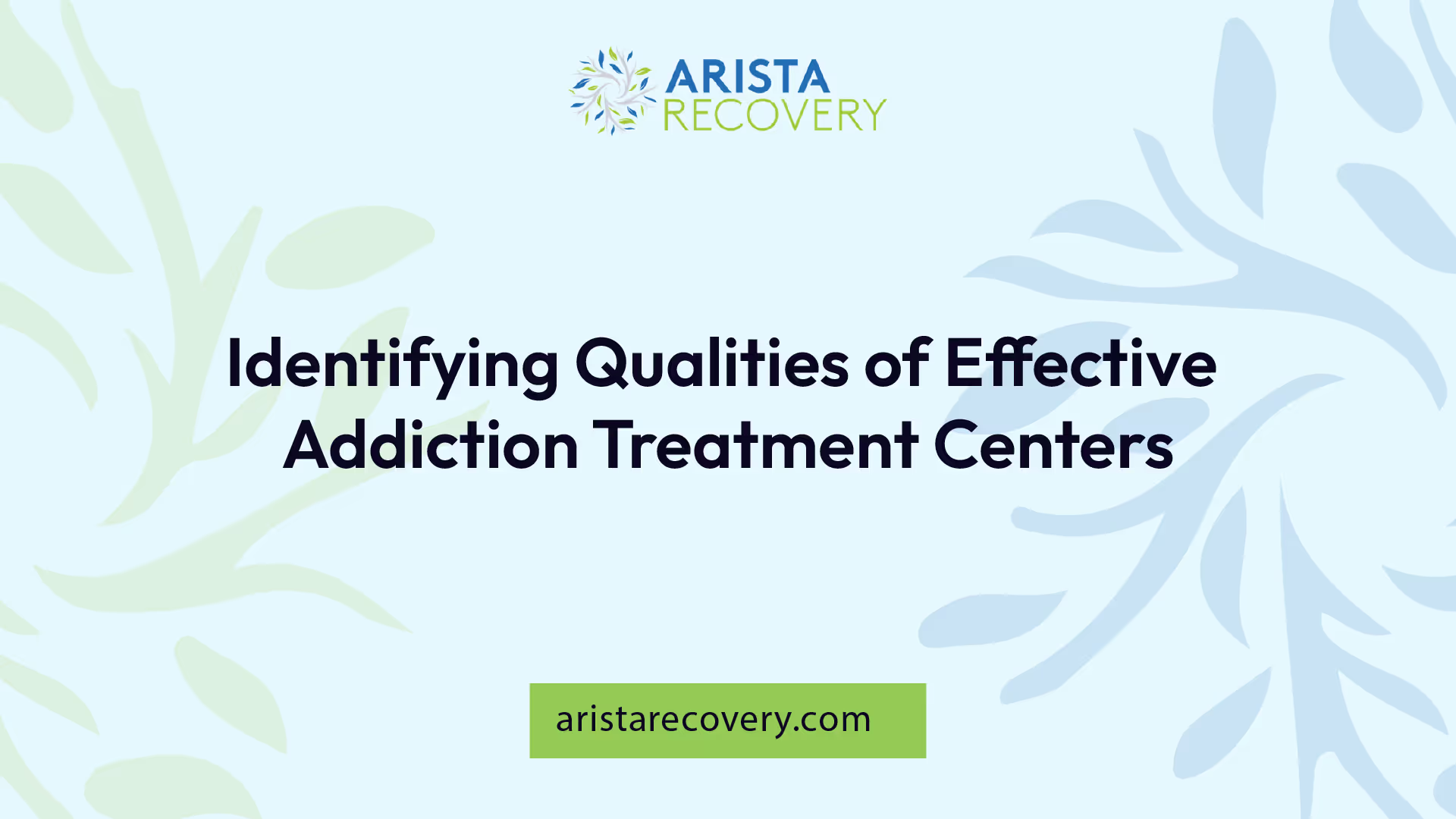Identifying Qualities of Effective Addiction Treatment Centers

Qualities of Effective Treatment Centers
Effective addiction treatment centers possess several key qualities that enhance their ability to support individuals on their recovery journey. Two of these critical aspects include comprehensive treatment approaches and assertive linkages to post-treatment support.

Comprehensive Treatment Approaches
Quality addiction treatment programs should implement comprehensive, integrated treatment methods. These approaches address not only substance use disorders but also any co-occurring psychiatric disorders and medical issues. Addressing these interconnected challenges improves the likelihood of recovery and long-lasting remission from addiction.
ComponentDescriptionIntegrated CareCombines mental health, physical health, and addiction treatment.Co-occurring Disorder TreatmentAddresses both addiction and psychological issues simultaneously.Individualized TherapyTailors treatment plans to meet the unique needs of each individual.
Such diverse treatment techniques enable patients to tackle multiple facets of their challenges, laying down a robust foundation for successful recovery [1].
Assertive Linkages to Post-Treatment Support
Effective addiction treatment centers emphasize assertive linkages to subsequent phases of treatment and recovery support. This ensures that individuals have access to ongoing care and crucial recovery-specific social support after completing their programs. These connections can be pivotal in preventing relapse and fostering sustained recovery.
ElementImportanceOngoing CareProvides continued medical and therapeutic assistance post-treatment.Social SupportConnects individuals with support groups and community resources.Follow-up ServicesFacilitates regular check-ins to monitor recovery progress.
Strong linkages help individuals transition smoothly from structured treatment environments back to their communities, promoting resilience and long-term recovery [1].
Importance of Dignified Environments
Creating a dignified environment in addiction treatment centers is essential for promoting recovery and maintaining the self-respect of patients. Quality addiction treatment facilities should maintain a respectful atmosphere akin to other medical settings. This approach is critical for helping individuals reclaim their self-worth and dignity, which are vital components of successful recovery.
Role of Family Involvement
Involving family members and significant others in the addiction treatment process can significantly enhance its effectiveness. Research suggests that engagement with family during treatment increases the likelihood of retention and long-term recovery [2]. By including family members, treatment centers strengthen the entire family system, assisting all members in coping with and adapting to the changes associated with recovery.
Benefits of Family InvolvementDescriptionIncreased Treatment RetentionPatients are more likely to remain in treatment programs when supported by family members.Enhanced CommunicationFamily involvement fosters better communication among family members, easing tensions.Support NetworkA strong family unit provides a robust support system, which is critical during recovery phases.Coping StrategiesFamilies learn coping mechanisms that help them adapt to changes in the recovering individual’s behavior.
Implementing a family-centered approach allows addiction treatment centers to address not only the individual’s substance use issues but also the dynamics of the family unit. This holistic strategy can alleviate stressors related to addiction, promote healing, and facilitate a more sustainable path to recovery.
By nurturing a dignified environment and actively involving family in treatment, addiction centers can foster conditions conducive to effective recovery. It reinforces the idea that recovery is a collective journey, where each member of the system plays a vital role in the healing process.
Evidence-Based Practices
In the realm of addiction treatment, utilizing evidence-based practices is vital for achieving effective outcomes. This includes the use of FDA-approved medications and ensuring that treatment centers are staffed by qualified professionals.
FDA-Approved Medications
Effective addiction treatment centers typically offer access to FDA-approved medications, which play a crucial role in managing withdrawal symptoms and reducing cravings. These medications can significantly improve treatment success rates and are often integrated into a comprehensive treatment plan. The availability of such medications ensures that patients receive the most scientifically-supported options for their recovery journey.
MedicationPrimary UsePotential BenefitsMethadoneOpioid dependenceReduces withdrawal symptoms, decreases cravingsBuprenorphineOpioid dependenceLower risk of overdose, long-lasting effectsNaltrexoneOpioid and alcohol dependenceBlocks the effects of opioids, reduces alcohol cravings
The integration of these medications alongside therapeutic approaches is essential for a well-rounded treatment program. According to Recovery Answers, the combination of FDA-approved medications and behavioral therapy tends to yield better recovery outcomes.
Qualified Staff
The effectiveness of addiction treatment centers is largely influenced by the qualifications and expertise of their staff. Fostering a supportive environment led by trained professionals is fundamental to delivering comprehensive care. Staff qualifications may include:
Staff RoleRequired QualificationsMedical DoctorsMD or DO with specialization in addiction medicine or psychiatryNursesRegistered Nurses (RN) with experience in addiction careCounselorsDegree in psychology or social work, specialized training in addiction therapyCase ManagersExperience in social work, certified in substance use counseling
Qualified staff members are equipped to design and implement individualized treatment plans tailored to each patient's needs. This approach increases the likelihood of lasting sobriety and leads to more focused recovery processes with reduced relapse rates. Studies have shown that centers employing well-trained personnel yield better treatment outcomes and establish a more effective recovery trajectory [3].
By focusing on evidence-based practices, including FDA-approved medications and qualified staff, effective addiction treatment centers can significantly enhance the recovery experience for individuals battling addiction.
Measuring Success in Treatment
Beyond Abstinence
Measuring success in addiction treatment encompasses more than just sobriety. Effective treatment programs evaluate a range of factors that provide a comprehensive view of a person's recovery journey. According to Addiction Rehab Centers, success can be defined by various metrics, including:
Success FactorsDescriptionSobriety RatesThe percentage of individuals maintaining abstinence from drugs or alcohol.Substance Use ReductionThe frequency and amount of substance use following treatment.Functionality and ProductivityImprovements in daily functioning, such as work performance and daily responsibilities.Relationship ImprovementsPositive changes in personal relationships and social support systems.
These factors collectively offer valuable insights into the effectiveness of addiction treatment methods and the overall progress of individuals.
Improved Physical and Mental Health
Improvement in physical and mental health is a crucial aspect of success in addiction treatment. Treatment programs aim to address the physical and psychological consequences of addiction and promote overall well-being. Successful programs monitor changes in health indicators such as:
Health IndicatorsImprovements SoughtMental HealthReduction in symptoms of anxiety, depression, or other mental health disorders.Physical HealthImproved overall fitness, weight management, and disease prevention.Life Skill DevelopmentEnhancement in coping skills and stress management strategies.
These developments not only contribute to the individual's recovery but also enhance functionality and productivity in various aspects of life. Achieving a positive shift in health often indicates a successful treatment experience and a reduced risk of relapse. Positive changes in personal relationships and social support further signal a strengthened foundation for sustained recovery.
Accreditation and Quality Standards
Accreditation and adherence to quality standards are essential for effective addiction treatment centers. They help ensure that facilities prioritize quality, safety, and evidence-based practices.
Role of CARF and Joint Commission
Accreditation from reputable bodies such as the Commission on Accreditation of Rehabilitation Facilities (CARF) and the Joint Commission signals that a treatment facility meets internationally accepted standards in addiction care. These organizations evaluate providers based on their commitment to high standards, safety measures, and research-based therapies [5].
Facilities accredited by CARF and the Joint Commission are required to undergo routine evaluations and must renew their accreditations every 1 to 3 years. This renewal process illustrates a facility's dedication to continuous improvement and quality assurance.
Benefits of Accreditation
The benefits of being accredited extend beyond mere recognition. They include:
BenefitDescriptionQuality of CareEnsures adherence to effective, research-based treatment methodologies.Insurance ReimbursementFacilitates coverage decisions by insurers, improving access for patients.Reduced RiskEnhances safety and decreases potential liabilities in various areas.
Accreditation serves as a hallmark of quality in addiction treatment facilities. Facilities that maintain these standards are better positioned to provide consistent and effective care, benefiting patients seeking support in their recovery journey.
Tailored and Individualized Care
The effectiveness of addiction treatment centers heavily relies on their ability to provide tailored and individualized care. This approach is essential for addressing each person's unique needs, circumstances, and experiences, leading to a more targeted and successful recovery process.
Personalized Treatment Plans
Personalized treatment plans are at the core of individualized care in addiction recovery. These plans recognize the complex interplay of biological, psychological, and social factors contributing to addiction. By developing a tailored plan, treatment centers ensure that each individual's specific circumstances are considered.
Components of a tailored recovery plan typically include:
ComponentDescriptionMedical DetoxificationInitial phase to safely manage withdrawal symptomsIndividual TherapyOne-on-one sessions to address personal issues related to addictionGroup TherapySupportive environment where experiences can be shared and processedHolistic TherapiesComplementary treatments such as yoga or meditationFamily TherapyInvolvement of family members to foster support and understandingAftercare PlanningContinued support to maintain recovery post-treatment
Implementing such comprehensive care ensures a holistic approach that addresses every aspect of the individual's addiction [3].
Ongoing Assessment and Adjustment
An essential aspect of individualized care is the ongoing assessment and adjustment of the treatment plan. This dynamic approach enables treatment centers to adapt to the individual's changing needs throughout their recovery journey.
Regular assessments allow for the identification of progress and potential challenges. Adjustments may include modifying therapy sessions, introducing new therapeutic modalities, or reassessing medication to ensure each plan remains relevant and effective.
Employing this responsive approach significantly increases the likelihood of lasting sobriety. It leads to a more effective recovery process, reduced relapse rates, and healthier coping mechanisms [3]. Individualized care promotes a supportive environment where each person can achieve their best potential for recovery.
References
[2]:
[3]:
[4]:
[5]:
You’re not alone in this.
When mental health challenges and addiction intersect, it can feel isolating. At Arista, we offer compassionate, evidence-based, and trauma-informed care to help you heal, grow, and move forward.
You’re not alone in this.
When mental health challenges and addiction intersect, it can feel isolating. At Arista, we offer compassionate, evidence-based, and trauma-informed care to help you heal, grow, and move forward.
Support that moves with you.
You’ve taken a brave first step. At Arista Recovery, we’re here to help you continue with best-in-class care designed for long-term healing and support.
.webp)






